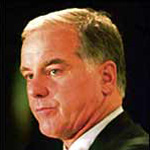 Douglas vetoes campaign finance, instant-runoff voting bills
Douglas vetoes campaign finance, instant-runoff voting billsBy Dave Gram
Published April 7th 2008 in The Boston Globe
MONTPELIER, Vt. --Gov. Jim Douglas on Friday vetoed the Legislature's latest effort to limit the influence of big money in politics, as well as an instant-runoff voting bill.
Douglas said his veto of the campaign finance bill was mainly due to his opposition to a provision limiting the amounts political parties can donate to campaigns. The legislation set a limit of $30,000 per election cycle on party contributions to gubernatorial candidates, lower limits for lesser offices.
"The proposed party contribution limits extend unfair political protection to incumbents by establishing an obstacle for challengers," Douglas wrote in his veto message to lawmakers. "These limits would particularly disadvantage potential candidates of modest means who are unable to fund their own campaigns."
Douglas contended the instant-runoff voting measure would violate the principle of one person, one vote enshrined in the U.S. Constitution, by allowing voters who's first choice for an office didn't win to have their second choices counted.
That was disputed by the executive director of a national election reform group. Rob Richie of Maryland-based FairVote said the question of one person, one vote had been specifically tested in court and that a Michigan instant-runoff voting law was found to have passed the test.
House Speaker Gaye Symington on Friday called Douglas' two vetoes "outrageous," and vowed a veto override attempt in the House on the campaign finance bill. Douglas vetoed a more ambitious campaign finance bill last year, and a veto override failed in the House by one vote.
The two campaign finance reform bills follow a 2006 ruling from the U.S. Supreme Court that a more restrictive law passed in 1997 was so onerous as to be unconstitutional. Backers of this year's bill said they tailored it to answer the court's -- and Douglas' -- concerns.
Symington said other states have tougher campaign finance limits than the ones proposed in Vermont this year. "This was a bill that would not have placed Vermont in the forefront of campaign finance legislation around the country," she said. "It would simply put in place reasonable limits on the influence of money in our elections. Governor Douglas has stepped firmly in the way of those kinds of reasonable limits."
She said she was also disappointed in Douglas' veto of the instant-runoff voting bill. "Both bills were about strengthening democracy."
Lawmakers limited the instant-runoff voting bill to races for the U.S. House and Senate after the attorney general's office issued an opinion that applying it to races for governor and other state offices would violate the state Constitution.
Douglas said in his veto message that supporters of instant-runoff voting should try to get it enacted as an amendment to the Vermont Constitution.
Instant-runoff voting, already in use in Burlington's city elections and in several other jurisdictions around the country, is designed for elections in which three or more candidates are running and in which none receives more than 50 percent of the vote.
Voters are invited to rank candidates in order of preference on the ballot. In the event no candidate wins a majority, a runoff is declared between the two top vote-getters. If a voter's top choice is not still in contention, the voter's ballot is assigned to his or her second choice and the ballots are counted again.
The Vermont Public Interest Research Group, FairVote and Common Cause-Vermont also criticized the veto.
Instant-runoff voting is "a pretty simple, straightforward way of enhancing voter choice," said Curt Fisher, board chairman with Common Cause-Vermont. "It's really disappointing that enhancing voter choice is not important to the governor."
Douglas said his veto of the campaign finance bill was mainly due to his opposition to a provision limiting the amounts political parties can donate to campaigns. The legislation set a limit of $30,000 per election cycle on party contributions to gubernatorial candidates, lower limits for lesser offices.
"The proposed party contribution limits extend unfair political protection to incumbents by establishing an obstacle for challengers," Douglas wrote in his veto message to lawmakers. "These limits would particularly disadvantage potential candidates of modest means who are unable to fund their own campaigns."
Douglas contended the instant-runoff voting measure would violate the principle of one person, one vote enshrined in the U.S. Constitution, by allowing voters who's first choice for an office didn't win to have their second choices counted.
That was disputed by the executive director of a national election reform group. Rob Richie of Maryland-based FairVote said the question of one person, one vote had been specifically tested in court and that a Michigan instant-runoff voting law was found to have passed the test.
House Speaker Gaye Symington on Friday called Douglas' two vetoes "outrageous," and vowed a veto override attempt in the House on the campaign finance bill. Douglas vetoed a more ambitious campaign finance bill last year, and a veto override failed in the House by one vote.
The two campaign finance reform bills follow a 2006 ruling from the U.S. Supreme Court that a more restrictive law passed in 1997 was so onerous as to be unconstitutional. Backers of this year's bill said they tailored it to answer the court's -- and Douglas' -- concerns.
Symington said other states have tougher campaign finance limits than the ones proposed in Vermont this year. "This was a bill that would not have placed Vermont in the forefront of campaign finance legislation around the country," she said. "It would simply put in place reasonable limits on the influence of money in our elections. Governor Douglas has stepped firmly in the way of those kinds of reasonable limits."
She said she was also disappointed in Douglas' veto of the instant-runoff voting bill. "Both bills were about strengthening democracy."
Lawmakers limited the instant-runoff voting bill to races for the U.S. House and Senate after the attorney general's office issued an opinion that applying it to races for governor and other state offices would violate the state Constitution.
Douglas said in his veto message that supporters of instant-runoff voting should try to get it enacted as an amendment to the Vermont Constitution.
Instant-runoff voting, already in use in Burlington's city elections and in several other jurisdictions around the country, is designed for elections in which three or more candidates are running and in which none receives more than 50 percent of the vote.
Voters are invited to rank candidates in order of preference on the ballot. In the event no candidate wins a majority, a runoff is declared between the two top vote-getters. If a voter's top choice is not still in contention, the voter's ballot is assigned to his or her second choice and the ballots are counted again.
The Vermont Public Interest Research Group, FairVote and Common Cause-Vermont also criticized the veto.
Instant-runoff voting is "a pretty simple, straightforward way of enhancing voter choice," said Curt Fisher, board chairman with Common Cause-Vermont. "It's really disappointing that enhancing voter choice is not important to the governor."
 On March 16th, Former Vermont Governor and Democratic National Committee Chair Howard Dean continued his support for instant runoff voting on Vermont Radio's Mark Johnson Show. Commenting on Burlington's recent IRV election, Dean said "I think the best and most democratic way to use to elect people in multiparty elections is instant runoff voting." Dean also supported the system when it was first used in Burlington in 2006.
On March 16th, Former Vermont Governor and Democratic National Committee Chair Howard Dean continued his support for instant runoff voting on Vermont Radio's Mark Johnson Show. Commenting on Burlington's recent IRV election, Dean said "I think the best and most democratic way to use to elect people in multiparty elections is instant runoff voting." Dean also supported the system when it was first used in Burlington in 2006. Citizens of Burlington, Vermont went to the polls on Tuesday, March 3rd to vote for the second time in an election using instant runoff voting. At 8:25 PM, the city declared that incumbent Mayor Bob Kiss had won reelection in the third and final round of counting, narrowly edging out challenger Kurt Wright, 51.5% to 48.5%. The race was unique in that it had four candidates that had a legitimate shot at winning: Progressive Kiss, Republican Wright, Democrat Andy Montroll, and independent Dan Smith. In most other American cities, there would be fear of "spoiler" candidates, but IRV allowed all four candidates to run without having to worry about being labeled "spoilers."
Citizens of Burlington, Vermont went to the polls on Tuesday, March 3rd to vote for the second time in an election using instant runoff voting. At 8:25 PM, the city declared that incumbent Mayor Bob Kiss had won reelection in the third and final round of counting, narrowly edging out challenger Kurt Wright, 51.5% to 48.5%. The race was unique in that it had four candidates that had a legitimate shot at winning: Progressive Kiss, Republican Wright, Democrat Andy Montroll, and independent Dan Smith. In most other American cities, there would be fear of "spoiler" candidates, but IRV allowed all four candidates to run without having to worry about being labeled "spoilers." On April 4, Vermont governor Jim Douglas chose to veto legislation to re-establish majority elections for Congress in his state through instant runoff voting. Vermont would have been the first state to enact IRV for Congress; legislative leaders affirmed their commitment to the bill, and it is sure to move in the state again. FairVote has worked hard to support this legislation, which likely generated more than 600 phone calls to the governor from Vermonters.
On April 4, Vermont governor Jim Douglas chose to veto legislation to re-establish majority elections for Congress in his state through instant runoff voting. Vermont would have been the first state to enact IRV for Congress; legislative leaders affirmed their commitment to the bill, and it is sure to move in the state again. FairVote has worked hard to support this legislation, which likely generated more than 600 phone calls to the governor from Vermonters.